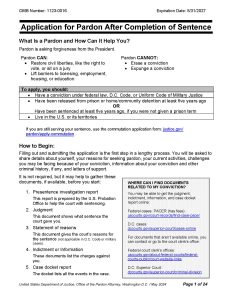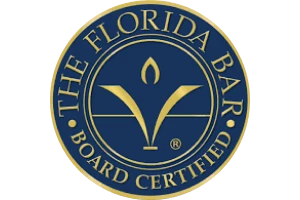Florida Clemency Petitions and Presidential Pardons

Clemency Petitions and Pardons: Understanding the Florida Process and Seeking Help
Introduction to Clemency and Pardons
Navigating the legal system after a conviction can be overwhelming, but understanding the process of clemency petitions and pardons is crucial for those seeking a second chance. In Florida, we specialize in helping individuals convicted of state court crimes request pardons and file clemency petitions. A pardon under Florida state law provides complete forgiveness for your crime and any associated penalties. This complex process involves the Florida Board of Executive Clemency, which reviews each case, may set hearings, allow testimony, and ultimately decide whether to grant pardons or clemency.

If you or a loved one is considering seeking a pardon, don’t hesitate to call Board Certified Criminal Trial Lawyer W.F. “Casey” Ebsary Jr at 813-222-2220 or use our online contact form to get started.
“In 2010, President Obama signed the Fair Sentencing Act, reducing unfair disparities in sentences imposed on people for offenses involving different forms of cocaine.”
“But there are still too many people in federal prison who were sentenced under the old regime — and who, as a result, will have to spend far more time in prison than they would if sentenced today for exactly the same crime.
“This is simply not right.”
Steps to Obtain a Presidential Pardon
Top Ten Steps to Secure a Presidential Pardon
| Step | Description |
|---|---|
| 1. Understand Eligibility | Ensure you meet the basic eligibility requirements, including the waiting period after conviction or release. |
| 2. Gather Documentation | Collect all necessary legal documents, including court records and personal statements. |
| 3. Consult an Attorney | Seek legal advice to navigate the complex application process effectively. |
| 4. Prepare a Personal Narrative | Write a compelling narrative explaining the circumstances of your offense and your rehabilitation. |
| 5. Collect Letters of Support | Obtain character reference letters from reputable individuals, such as employers or community leaders. |
| 6. Complete the Application | Fill out the presidential pardon application thoroughly and accurately. |
| 7. Submit the Application | Send your completed application to the Office of the Pardon Attorney. |
| 8. Follow Up | Maintain communication with the Office of the Pardon Attorney to track your application’s progress. |
| 9. Prepare for a Hearing | If granted a hearing, prepare to present your case convincingly. |
| 10. Stay Informed | Keep abreast of any changes in the law or clemency procedures that might affect your case. |
Why Seek a Pardon?
A pardon can provide numerous benefits, including restoring your civil rights, improving employment opportunities, and helping to erase the stigma associated with a criminal conviction. For business professionals and college graduates, a pardon can be particularly crucial in allowing you to pursue your career goals without the burden of a criminal record.
Call to Action
If you are considering filing for a pardon or clemency, our experienced team is here to guide you through every step of the process. Contact Board Certified Criminal Trial Lawyer W.F. “Casey” Ebsary Jr at 813-222-2220 or use our convenient online contact form to start your journey toward a second chance.
If you or a loved one is considering seeking a pardon, don’t hesitate to call Board Certified Criminal Trial Lawyer W.F. “Casey” Ebsary Jr at 813-222-2220 or use our online contact form to get started.
Conclusion
Securing a pardon is a challenging but achievable goal with the right preparation and support. Whether you are seeking a presidential pardon or a governor’s pardon in Florida, understanding the process and having expert assistance can make all the difference. Reach out to us now to learn more about how we can help you navigate this complex legal journey.
For immediate assistance, call Board Certified Criminal Trial Lawyer W.F. “Casey” Ebsary Jr at 813-222-2220 or fill out our online contact form, and take the first step toward reclaiming your future.
Clemency in Federal Court
When pardon or clemency is needed, we can provide a solution. Call us today at (813) 222-2220 for a free initial consultation.
If it is more convenient for you, we respond quickly to your call for help via our Call For Help web submission. They are sent to us wirelessly. We are constantly checking and responding, and will quickly get back to you via telephone or email.
Does the President Have Authority to Grant Clemency for a State Conviction?
According to DOJ, “No. The President’s clemency power is conferred by Article II, Section 2, Clause 1 of the Constitution of the United States, which provides: “The President . . . shall have Power to grant Reprieves and Pardons for Offenses against the United States, except in Cases of Impeachment.” Thus, the President’s authority to grant clemency is limited to federal offenses and offenses prosecuted by the United States Attorney for the District of Columbia in the name of the United States in the D.C. Superior Court. An offense that violates a state law is not an offense against the United States. A person who wishes to seek a pardon or a commutation of sentence for a state offense should contact the authorities of the state in which the conviction occurred. Such state authorities are typically the Governor or a state board of pardons and/or paroles, if the state government has created such a board.
Here’s a FAQ summary of the instructions used on the Application for Pardon After Completion of Sentence :
A pardon is an act of forgiveness from the President.
It can restore civil liberties (like voting) and remove barriers to things like licensing and employment.
It does NOT erase or expunge the conviction.
Individuals convicted under federal law, D.C. Code, or the Uniform Code of Military Justice.
Must have completed their sentence (including any supervised release) at least five years ago.
Must live in the U.S. or its territories.
Those still serving their sentence should apply for commutation instead.
The application is divided into sections:
Background Information: Identity verification.
Reasons for Seeking Pardon: How the conviction has impacted your life and what you hope a pardon will change.
Life Since Conviction: Details about your community activities, education, places lived, military service, job history, sobriety, and finances.
Case Background and Criminal History: Information about the conviction and any other criminal record.
Certification and Oath: Your signature affirming the truthfulness of the application.
Authorization for Release of Information: Allows the government to investigate your background.
Letters of Support: At least three letters from people who can speak to your character.
Application Checklist: A final review to ensure completeness.
Time needed: 365 days
How to apply for a Presidential Pardon.
- Application
The application is the first step in a long process (months or years).
- Information
You’ll need to provide detailed information about yourself, your conviction, your life since the conviction, and your reasons for seeking a pardon.
- Documents
Gather documents like your presentence investigation report, judgment, statement of reasons, indictment/information, and case docket report, if possible.
- Letters of Support and References
You will need at least three letters of support from people not related to you.
Important Presidential Pardon Considerations:
- Answer all questions honestly and completely. False statements can lead to denial or even criminal charges.
- The process takes a long time; keep your contact information updated.
- No outcome is guaranteed.
- If granted or denied a pardon, your name will be made public.
- The Office of the Pardon Attorney collects and uses your information to make a recommendation to the President.
- You have the right to not provide information, but it may hinder the processing of your application.
Where to Find Documents:
- Federal cases: PACER (online, with fees).
- D.C. cases: dccourts.gov/superior-court/cases-online
- For documents not online, contact the relevant court clerk’s office.
We hope this explains the pardon process, who is eligible, what information is required, and the potential outcomes. It emphasizes the importance of honesty, thoroughness, and patience throughout the application process.
If you or a loved one is considering seeking a pardon, don’t hesitate to call Board Certified Criminal Trial Lawyer W.F. “Casey” Ebsary Jr at 813-222-2220 or use our online contact form to get started.
Text of a Presidential Pardon
Executive Grant of Clemency
TO ALL TO WHOM THESE PRESENTS SHALL COME, GREETING:
WHEREAS PHILIP ESFORMES, Reg. No. 13746-104, was convicted, in the United States District Court for the Southern District of Florida on an indictment (Docket No. 16-20549CR-SCOLA) of violations of Sections 371, 1503, I956(a)(I )(B)(i), and I956(h), Title 18, and Sections 1320a-7b(b)(I)(A) and 1320a-7b(b)(2)(A), Title 42, United States Code, for which a total sentence of240 months’ imprisonment, three years’ supervised release. $5.530.207restitution, and a special assessment of $2.000 was imposed on September 12, 2019, as amended on November 21, 2019;
And WHEREAS the said PHILIP ESFORMES has been confined continuously since his arrest on July 22,2016, and is presently incarcerated at the Federal Correctional Institution Miami in Miami, Florida; and
WHEREAS it has been made to appear that the ends of justice do not require the said PHILIP ESFORMES to remain confined until his currently projected release date of August 6, 2033, and the safety of the community will not be compromised if he is released;
NOW, THEREFORE, BE IT KNOWN that I, DONALD J. TRUMP, President of the United States of America, in consideration of the premises, divers other good and sufficient reasons me thereunto moving, do hereby grant clemency to the said PHILIP ESFORMES: I commute the 240-month prison sentence imposed upon the said PHILIP ESFORMES to time served. I leave intact and in effect the remaining three-year term of supervised release with all its conditions, the unpaid balance of his $5,530,207 restitution obligation, if any. and all other components of the sentence.
I HEREBY DESIGNATE, direct, and empower, the Office of the Pardon Attorney, as my representative, to deliver to the Bureau of Prisons, to the United States District Court for the Southern District of Florida, and to the said PHILIP ESFORMES a certified copy of this document as evidence of my action in order to carry into effect the terms of this grant.
I ALSO DIRECT the Bureau of Prisons, upon receipt of this warrant, to effect the immediate release of the said PHILIP ESFORMES with all possible speed.
IN TESTIMONY WHEREOF I have hereunto signed my name and caused the seal of the Department of Justice to be affixed.
Done at the City of Washington in the District of Columbia
Call Today
If you are considering filing for a pardon or clemency, our experienced team is here to guide you through every step of the process. Contact Board Certified Criminal Trial Lawyer W.F. “Casey” Ebsary Jr at 813-222-2220 or use our convenient online contact form to start your journey toward a second chance.
If you or a loved one is considering seeking a pardon, don’t hesitate to call Board Certified Criminal Trial Lawyer W.F. “Casey” Ebsary Jr at 813-222-2220 or use our online contact form to get started.
Clemency Petitions and Pardons in Florida
We help people convicted of state court crimes request pardons and file clemency petitions. A Pardon under Florida state law provides complete forgiveness for your crime and any penalty associated with it. A pardon is a complicated process where the Florida Board of Executive Clemency reviews each case, may set a hearing, allow testimony, and decide to grant pardons.
The Process of Obtaining a Pardon in Florida
Understanding Clemency and Pardons
Clemency is a broad term that includes various forms of relief from the consequences of a criminal conviction. A pardon is a specific type of clemency that offers full forgiveness for the crime. This process is intricate and requires meticulous preparation and understanding of legal procedures.
The Role of the Florida Board of Executive Clemency
The Florida Board of Executive Clemency, consisting of the Governor and members of the Cabinet, is responsible for reviewing clemency petitions and enforcing clemency rules in Florida state court cases. They hold the authority to grant pardons, commute sentences, and offer other forms of clemency. The board meets quarterly to review cases, set hearings, and make determinations based on the presented evidence and testimonies.
Tips for Obtaining a Governor’s Pardon in Florida
- Eligibility Check: Verify that you meet the specific criteria for a pardon in Florida, including the required waiting period after conviction.
- Strong Personal Statement: Craft a powerful personal statement that highlights your remorse, rehabilitation efforts, and positive contributions to society.
- Support Letters: Gather letters of support from employers, community leaders, and other credible sources to bolster your application.
- Legal Assistance: Consult with a legal professional experienced in clemency and pardon applications in Florida.
- Detailed Application: Ensure your application is comprehensive, well-organized, and free of errors to present the strongest possible case.
Deep Dive Into Clemency Petitions and Pardons Clemency With Some Details Provided by the Governor’s Office
RESTORATION OF CIVIL RIGHTS, PARDONS, PARDONS WITHOUT FIREARM AUTHORITY, FIREARM AUTHORITY, REMISSION OF FINES AND FORFEITURES
Effective March 9,2011
This information pertains to Restoration of Civil Rights and all other forms of clemency with the exception of Commutation of Sentence requests. A Request for Review (Form 1502) must be completed for the Commutation of Sentence process.
Restoration of Civil Rights cases are divided into two categories: Without a Hearing (Rule 9.A.) and With a Hearing (Rule 10.A.)
RESTORATION OF CIVIL RIGHTS WITHOUT HEARING CASES:
This type of investigation is designed to process less serious offenses and requires you to be crime and arrest free for 5 years prior to being reviewed by the Florida Commission on Offender Review (FCOR). You are also required to provide certified court documents for EACH felony conviction with the application before it will be entered into our system. A certified court document is a copy of the original document on file with the applicable agency (Clerk of Court, State Attorney’s Office, Law Enforcement Agency, etc.), which bears the Clerk’s original signature and seal attesting that the document is a true and correct copy of the original. The court documents can be obtained from the Clerk of Court in the county where the offense occurred and consist of the charging document (often referred to as the State Attorney Information or Indictment), Judgment; and Sentence/Community Control/Probation Order.
RESTORATION OF CIVIL RIGHTS WITH A HEARING CASES:
This type of investigation is designed to process the more serious offenses and requires that 7 years have passed since the date of completion of all sentences and conditions of supervision imposed for all felony convictions. You are also required to provide certified court documents for EACH felony conviction with the application before it will be entered into our system. The court documents can be obtained from the Clerk of Court in the county where the offense occurred as stated above. During the investigative phase, the Executive Clemency Board will consider, but not be limited to, the following factors when determining whether to grant an applicant restoration of civil rights or other form of clemency.
The nature and circumstances of the offense
Prior and subsequent criminal record, including traffic offenses
Employment History
Mental health, drug, or alcohol issues
Domestic violence issues
Letters submitted in support of, or in opposition to, the granting of executive clemency.
The information this agency requests from you is necessary to provide the basic facts needed by the Clemency Board to make an informed judgment as to whether or not you should be granted Restoration of Civil Rights or any other form of clemency. You are under no obligation to furnish any information. However, unless you do provide us with this information, we will be unable to provide complete information to the Clemency Board.
If your request requires a hearing, you will be scheduled to meet with a Commission Investigator with the Florida Commission on Offender Review (FCOR), who is assigned the investigative phase by the Clemency Board for an interview. This FCOR Commission Investigator may also speak with individuals who have written character or reference letters, employers, and other individuals who may be able to provide relevant information concerning you.
If you are granted Restoration of Civil Rights based on the Without a Hearing investigation, you will be sent a Certificate of Restoration of Civil Rights to the address on file. If the Clemency Board grants an application regarding a With a Hearing case, an Executive Order will be prepared, signed by the Clemency Board members, and a copy mailed to you.
PARDON OR PARDON WITHOUT FIREARM AUTHORITY
The Rules require that you must have completed all sentences imposed and all conditions of supervision have expired or been completed, for a period of no less than 10 years. You may not have any outstanding detainers or pending charges, owe restitution, or have any pecuniary penalties or liabilities, which total more than $1,000 and result from any criminal conviction or traffic infraction. This form of clemency requires an in-depth interview with an FCOR Commission Investigator. Individuals convicted in a federal, military, or out-of-state court are not eligible to apply.
FIREARM AUTHORITY:
The Rules require that you must have completed all sentences imposed and all conditions of supervision have expired or been completed, for a period of no less than 8 years. You may not have any outstanding detainers or pending charges, owe restitution, or have any pecuniary penalties or liabilities, which total more than $1,000 and result from any criminal conviction or traffic infraction. This form of clemency requires an in-depth interview with a Commission Investigator with the Florida Commission on Offender Review (FCOR).
Individuals convicted in a federal, military, or out-of-state court are not eligible to apply. The fact that your rights have been granted is public record. Whether you have filed an application and the case is still pending investigation is not public information. Executive clemency files are maintained to provide for the exercise of the Governor and Cabinet’s Constitutional clemency power and are routinely made available to them, members of their staff and other officials concerned with these proceedings. The Governor is the only person who can release information regarding an individual’s clemency and can do so when required by law or to further the ends of justice.
ADDITIONAL INFORMATION: You will not be eligible for any form of clemency if: you owe restitution, have pending criminal charges, or outstanding detainers or warrants. You are not required to appear with an attorney. All information submitted to the Office of Executive Clemency becomes the property of this office and will not be returned. Keep copies of any paperwork you may need in the future.
Any eligible person who has been granted or denied any form of executive clemency may not apply for further executive clemency for at least 2 years from the date that such action became final.
A Request for Review of a Commutation of Sentence requires a 5 year waiting period before applying again.
This information was Updated by the State of Florida on July 2, 2019.
Clemency in Federal Court
When pardon or clemency is needed, we can provide a solution. Call us today at (813) 222-2220 for a free initial consultation.
If it is more convenient for you, we respond quickly to your call for help via our Call For Help web submission. They are sent to us wirelessly. We are constantly checking and responding, and will quickly get back to you via telephone or email.
According to DOJ, “No. The President’s clemency power is conferred by Article II, Section 2, Clause 1 of the Constitution of the United States, which provides: “The President . . . shall have Power to grant Reprieves and Pardons for Offenses against the United States, except in Cases of Impeachment.” Thus, the President’s authority to grant clemency is limited to federal offenses and offenses prosecuted by the United States Attorney for the District of Columbia in the name of the United States in the D.C. Superior Court. An offense that violates a state law is not an offense against the United States. A person who wishes to seek a pardon or a commutation of sentence for a state offense should contact the authorities of the state in which the conviction occurred. Such state authorities are typically the Governor or a state board of pardons and/or paroles, if the state government has created such a board.
Call Today
If you are considering filing for a pardon or clemency, our experienced team is here to guide you through every step of the process. Contact Board Certified Criminal Trial Lawyer W.F. “Casey” Ebsary Jr at 813-222-2220 or use our convenient online contact form to start your journey toward a second chance.
If you or a loved one is considering seeking a pardon, don’t hesitate to call Board Certified Criminal Trial Lawyer W.F. “Casey” Ebsary Jr at 813-222-2220 or use our online contact form to get started.









